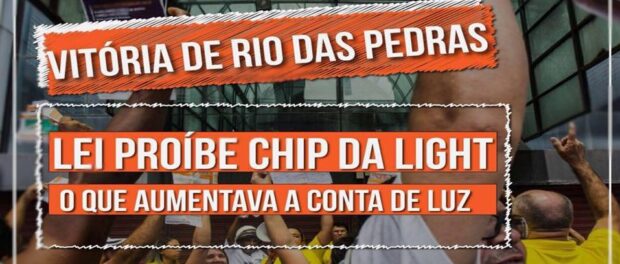
In a big win for Rio das Pedras favela residents, Rio’s municipal electric utility, Light, has been ordered to remove its most recent model of electric meters across the city. With residents reporting skyrocketing electricity bills in recent months, this decision comes as a major victory for the recently-formed Rio das Pedras Residents’ Commission which, within only three months, mobilized successfully to pressure legislators to take action.
On Tuesday, April 3, City legislators passed a law forcing the provider not only to stop any new installations of the new meters, but also to replace all meters currently in place to measure electricity consumption throughout the city. Each day the company doesn’t comply, it will be fined R$30,000 (US$9,000). The process to pass this bill was long and complicated, starting early in 2017, and was met with a veto by Mayor Marcelo Crivella last year. It wasn’t until the Rio das Pedras Commission began organizing, mobilizing, and protesting in force that City Council members were able to push through the legislation with enough votes to override the mayor.
The Rio das Pedras favela was officially incorporated into the municipal electric grid between 2014 and 2015. Since then, electric bills have risen astronomically and promises made by Light to maintain a fixed rate for the community were broken. All of this culminated in the Commission taking action early in 2018, as bills were reaching over R$1,000 per month for some households, forcing some residents to live in the dark and even move from the community.
Commission member Andréia Ferreira explained the group’s mobilization process: “We realized that everything started once they changed the [electric meter] chips. This happened recently in Rio das Pedras, so we began to understand why this happened after this change. We searched the Internet, we started studying exactly how this chip differs from others. While researching, we saw that it wasn’t just Rio das Pedras—many communities in need have suffered for the same reason. From there, we realized that in Nova Iguaçu there already exists a law prohibiting this chip. It’s been a problem in many of the places it’s been installed. We also discovered that there was a bill from City Councillor Willian Coelho that would do the same thing that was done in Nova Iguaçu: prohibit the chip in the city of Rio de Janeiro.”
After doing research, the Commission mobilized. The group organized several protests until members were invited to meet with Light executives themselves. Residents also accompanied the process of the new law and made sure their voices were heard by the City Council. The law, which had been stagnant for over a year, eventually passed after several days of hearings. The Commission had a clear impact in pressuring legislators to take action, making this the group’s second major political victory since its formation. In late 2017, the Commission was also successful in holding off Mayor Crivella’s plan to remove a large part of the neighborhood and replace it with high-rise apartment complexes. Rio das Pedras residents are currently expecting another City proposal for upgrading the community, and have been on alert monitoring threats to all residents whether in the form of exorbitant electric bills or the chronic shortage of public school teachers.
As Ferreira reflected, “The question of social cleansing comes up, [and of] gentrification, because here a lot of people have left because they weren’t able to pay electric bills. There are many people who have moved to smaller places, many who are living in the dark. People are having a lot of difficulty, paying their debts on credit to not miss a payment. We are going to continue fighting until things really change like the situation with Crivella—not just me, but the entire Commission and all the residents of Rio das Pedras. We will continue fighting. We will continue mobilizing.”


